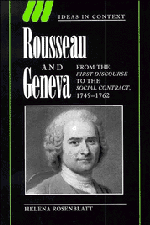Book contents
- Frontmatter
- Contents
- Acknowledgments
- Note on translation
- List of abbreviations
- Introduction. Rousseau in a Genevan context
- 1 The formation of a “citizen of Geneva”
- 2 Rousseau becomes Rousseau, 1751–1754. Geneva, doux commerce, and Rousseau from the First to the Second Discourse
- 3 Rousseau and natural law: the context
- 4 Rousseau and natural law: the Second Discourse
- 5 The “invisible chain”: Rousseau and Geneva from the Second Discourse to the Social Contract
- 6 The Social Contract
- Epilogue
- Select bibliography
- Index
- IDEAS IN CONTEXT
3 - Rousseau and natural law: the context
Published online by Cambridge University Press: 28 October 2009
- Frontmatter
- Contents
- Acknowledgments
- Note on translation
- List of abbreviations
- Introduction. Rousseau in a Genevan context
- 1 The formation of a “citizen of Geneva”
- 2 Rousseau becomes Rousseau, 1751–1754. Geneva, doux commerce, and Rousseau from the First to the Second Discourse
- 3 Rousseau and natural law: the context
- 4 Rousseau and natural law: the Second Discourse
- 5 The “invisible chain”: Rousseau and Geneva from the Second Discourse to the Social Contract
- 6 The Social Contract
- Epilogue
- Select bibliography
- Index
- IDEAS IN CONTEXT
Summary
Having turned his attention to politics by 1753, it would have been natural for Rousseau also to turn his attention to modern natural law theory. In cultivated circles, an acquaintance with the works of Grotius, Pufendorf, Barbeyrac, and Burlamaqui was considered an essential part of every man's political education. The Encyclopédie did much to popularize and to spread their theories, many of the articles borrowing freely from them. In return, a natural law theorist like Barbeyrac publicly hailed advances in the arts and sciences as very beneficial for society. For example, in a speech delivered at the Academy of Lausanne and thereafter published in Geneva in 1714, Barbeyrac enumerated the many advantages brought to society by the letters and sciences and further held that these “sweet influences [douces influences]” were spread by commerce. That was why “one regards as savage a nation which completely closes in on itself and does not want to have any commerce with others.” Such a nation thereby deprived itself of “a thousand commodities” and “a thousand occasions to imitate.” Speaking of the uncultivated masses, Barbeyrac added that even they benefited from the advances in the arts and sciences “by the commerce they have with polite and enlightened people.”
Rousseau had been exposed to the work of Grotius, Pufendorf, and Barbeyrac at a relatively early date. His friend, Diderot, was a great admirer of these thinkers. But now that Rousseau had become politicized, he could turn to them with a more critical eye.
- Type
- Chapter
- Information
- Rousseau and GenevaFrom the First Discourse to The Social Contract, 1749–1762, pp. 88 - 158Publisher: Cambridge University PressPrint publication year: 1997



